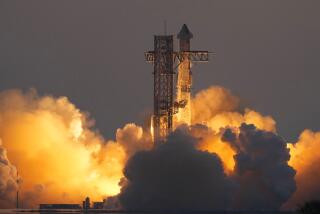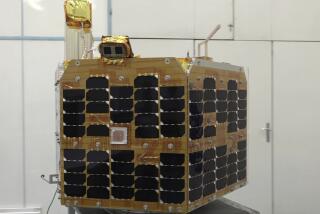North Korea defies West with second firing of long-range rocket
- Share via
SEOUL -- North Korea launched a long-range rocket Wednesday morning in defiance of international warnings that the second test-firing of a missile this year would violate international sanctions.
The Japanese government said Wednesday that debris from North Korea’s long-range rocket fell into waters off the Philippines at 10:05 a.m. after passing over Okinawa.
Pyongyang fired the Unha-3 rocket at 9:51 a.m., Seoul’s defense ministry said earlier in the day.
Japan didn’t order its military to intercept the North Korean rocket, according to officials.
Shortly after the North’s defiant launch, the Japanese government convened an emergency meeting of security-related ministers.
“It appears that the first stage was successful, the question is whether the second and third stage separated,” said a military analyst in Seoul.
In announcing last week that the launch would be made between Dec. 10 and Dec. 22, North Korea described the mission as a peaceful test of its ability to put a satellite in orbit. The U.S., South Korea and other nations, however, condemned the planned firing as a brazen attempt to demonstrate Pyongyang’s ability to reach U.S. territory with a nuclear warhead.
The launch surprised policy analysts, as reports Tuesday had suggested that North Korea had removed the rocket from the launch pad and begun dismantling it to correct a technical glitch.
“Everybody was expecting this to be delayed,” said Daniel Pinkston, an analyst with the International Crisis Group in Seoul.
North Korea reported that the first stage of the rocket fell into waters near the Philippines, though it was unclear whether the separation occurred where intended. It was also not immediately known whether the second and third stages separated before missile debris was detected falling into the sea.
The launch was the second since new leader Kim Jong Un came to power a year ago. In April, Pyongyang launched a similar rocket that broke up and plunged into the sea less than two minutes after liftoff.
North Korea analysts say the latest undertaking is a bid to regain face after the April failure, and an attempt to bolster Kim’s profile with the North Korean military.
Pyongyang announced at the beginning of December that its scientists had analyzed the errors behind the April failure, but Western analysts were skeptical that it had had enough time to fix the problems.
ALSO:
U.S. blacklists Syrian rebel group for Al Qaeda ties
Egypt’s political fault lines shaken by rival protests in Cairo
Mali again in turmoil after soldiers force prime minister to resign
More to Read
Sign up for Essential California
The most important California stories and recommendations in your inbox every morning.
You may occasionally receive promotional content from the Los Angeles Times.










